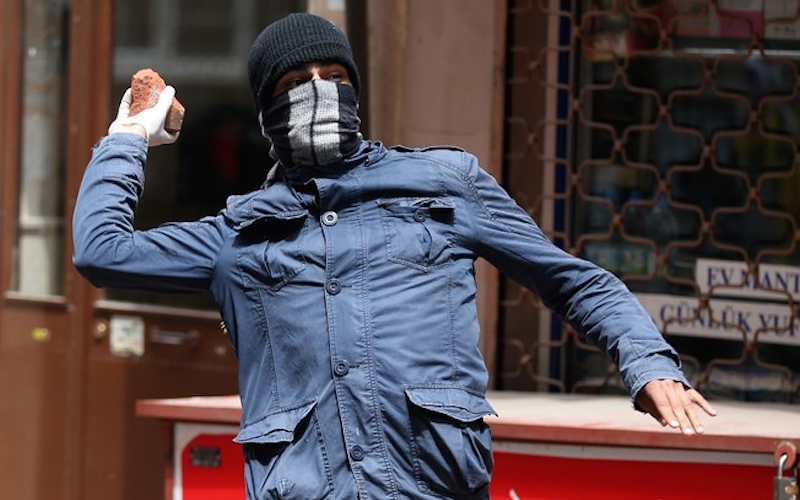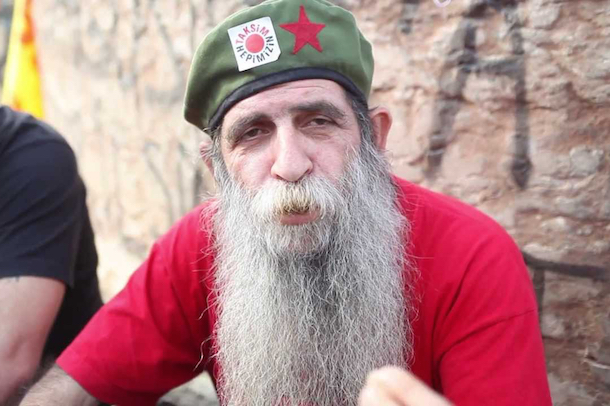
What Happens to the Opposition in the Aftermath of the Turkish Coup?
During this year’s May Day, Istanbul walls were full of posters of Marxist and socialist organizations, from a clenched fist to the logo of the hammer and sickle. “ISIS, symbol of imperialist barbarism” could be found on the posters, implying that Western countries, especially the United States, had a role in creating and strengthening ISIS. This was not new. Every year during May Day protests in Taksim Square and in other cities of Turkey, the members of labor unions and communist forces always engage in protests, which eventually lead to violence and result in clashes with police.
The climax of the activities of radical and active leftists was the protest of Gezi Park in 2013. Many analysists called it the “Turkish Spring.” But that protest was suppressed. Now, three years have passed since the protest and Turkey is experiencing rough days, following an abortive coup.
The government accused Fethullah Gülen, the Turkish religious preacher living in Pennsylvania, of inciting this coup, and the AK Party believes that his supporters have infiltrated the security forces and the Turkish military. In response, Erdogan has ordered the arrest of thousands of people in the government which has led human rights organizations to express concerns about the rights of the detainees. The conservative Turkish government is also concerned about increased leftist tendencies. For example, Ismail Kahraman, the speaker of the Turkish Parliament, has recently criticized youth wearing T-shirts with the image of Che Guevara. He called Che Guevara a murderer and claimed that unfortunately Turkish youth do not have any knowledge about Ottoman sultans.
What is the current status of leftists in Turkish policy? Why are they silent?
Ali Murat Irat, a Turkish journalist who writes for Birgun Newspaper explained to me in an interview: “In Turkey there is a big political sphere for the left. Because whoever comes to power in Turkey, exploitation of labor and infringement of human rights are on. Despite its fragmentation, the left has a big and powerful political tradition. So the leftist groups, if they act logically, can change the situation because, first of all, the situation of people in Turkey is suitable to produce new policy against exploitation and violence.”
In the historical context, the leftists have a history of radical activities and street protests. The Turkish people remember the protests of July, 1970 in Istanbul, as well as the tragedy of May 1, 1977 in Taksim Square. The leftists have always been suppressed by the secular military on one hand and by the Islamists on the other.

The definition of a leftist protest in Turkey might be difficult to define due to the diversity and vulnerability of the leftist groups. The main party opposing the Republican People’s Party (CHP), the oldest party in Turkey, was established by Ataturk. This party defines itself as the social representative of Turkish Social democracy and as a defender of secularism and Kemalist ideals, namely modernism, and is a Member of The Socialist International. The party has cooperated with the military coup leaders in past decades, but has recently introduced itself as a party defending human rights and democracy. The question arises as to why Kemal Kilicdaroglu, the leader of this party, who is one of the main critics of Erdogan did not support the recent Turkish coup, whose leaders called themselves supporters of human rights?
Ali Murat Irat suggested: “I guess, CHP leadership thought that if they don’t join to rally they can lose the support of a conservative power base. But, besides, conservative voters do not vote for CHP. But they want to gain their support in a sort of way. Moreover, AKP became more skillful to produce social perception on any issue because AKP possess most of the media power in Turkey. I think CHP leadership refrained from being mentioned as supporting the coup by not joining the rally. It is true that the people in the streets (called ‘democracy watch’) are mostly supporter of AKP. But this does not mean that the other parties or their followers support any military coup. But I think that, in coming years, AKP government is a representative of the conservative bourgeoisie. AKP will go on its standard and conservative policy after that. CHP is not a totally leftist party and because it is a founder party of Turkey it typically shows nationalist reflexes. It is not a surprise to show rightist attitudes. Kemalism is a social project and it has two main acts. One of them is modernism and the other one is capitalism. AKP is against the modernist and secular face of Kemalism but it embraces its capitalist view. But we have to notice that even so Kemalism has some social democratic items in its policy but AKP has not.”
Bayram Balci, a nonresident scholar in Carnegie’s Russia and Eurasia Program, cited the Kurdish issue as an important factor in the CHP decision: “The CHP is opposed to the ruling party AKP but the aggravation of the Kurdish issue, the reinforcement of the guerrilla in the country has created a sort of ‘holy union’ against terrorism in Turkey. This reinforces the AKP but not the CHP which is de facto taken hostage by the AKP in the struggle against the PKK. The CHP cannot criticize AKP policy toward the Kurds, if it criticizes it will be considered as a traitor to the motherland.”
Dr. Can Büyükbay with the Turkish-German University suggested: “The CHP is the guarantee for secularism in Turkey and will stay so. The party tries to soften the strong polarization between the different segments in Turkey.”
People’s Democratic Party (HDP) is another leftist party that, unlike the Republican People’s Party, is more radical. It is basically a Kurdish party and sent representatives to the Parliament by way of a coalition of radical leftists including feminists and gay rights activists. This party is defined by class issues, and differs from Kemalism which believes in an integrated and united community with an emphasis on Turkish identity and a commitment to opposing domestic and external enemies. The Erdogan government doesn’t have a good relationship with this party. Under these circumstances, is there any chance for alliance between this party and the Republican Party, despite their disagreement on the Kurdish and Kemalism issues?
In a recent interview, Bayram Balci told me: “Leftist forces are very weak and irresponsible in Turkey. Turkish opposition is very divided, and the dialogue between HDP and CHP is impossible because of the Kurdish issue that divides them. Erdogan is popular simple because he is the representative of the majority of Turks: in Turkey 80 percent of the population is Muslim, Sunni, and conservative. With such a percentage it is not difficult for him to get 40 or 45 percent of votes in each election. With such a situation and with a very divided opposition, between nationalist with MHP, Kemalist with CHP and Kurdist with HDP, it is not difficult for Erdogan to win elections.”
Büyükbay holds a different view: “I think, the only realistic option possible for leftist forces to become an alternative to the AKP is the following: Even if it seems for now a hard option, the progressive and leftist parts of the HDP, which distance themselves from the terrorist activities of the PKK and the CHP should emphasize the commonalities of Kurdish and Turkish people and create common strategies to build a strong opposition to the government. That will be healthy for balancing power in Turkish politics. But for now, it seems almost impossible.”
Erdogan’s foreign policy has become more like that of Iran and Russia. However, Turkey has been the United States’ main ally in the region since 1952, when it became a NATO member. The leftists have always criticized this relationship with the US and believed that Turkish independence is weakened through this alliance. Are they pleased that Erdogan is distancing Turkey from the United States? Is this change in Turkish foreign policy serious?
Büyükbay suggested: “Turkey cannot distance itself from the West, change its axis and simply turn itself towards new co-operations with Russia, Iran or China. That is impossible due to the economic inter-dependence and strong ties between Turkey and Western countries. As you look at economic indicators, you can clearly observe this fact.”
In the 1960 coup, which resulted in the fall of the conservative government of Adnan Menderes, many Turkish leftists supported the temporary government and defended the progressive Kemalist ideas, like modernity and individual freedom. Why did the leftists not support the recent coup in spite of increased pressure exerted on the opponents by the AK Party conservative government?
Buyukbay is optimistic and believes that the government not only attacks the Gülenists but also the leftists in state institutions through decree laws which serve to weaken oppositional groups. The left-wing groups must come together and organize effectively against unlawful and unjust decisions.
Ahmet Erdi Ozturk, research assistant of Strasbourg University, expresses a different view and told me: “I do not think there will be another coup in the near future and I really do not want that. Moreover, unfortunately there are no serious left forces in Turkey. But there are many Kemalist and nationalist groups who have been organizing against the Erdoğan regime. But to be honest they are not politically powerful.”
